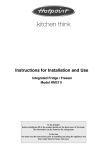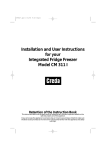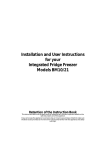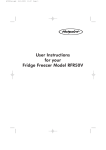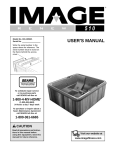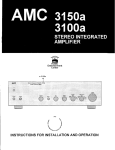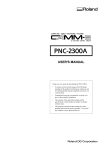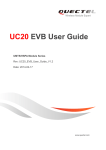Download Hotpoint RSR50V Refrigerator User Manual
Transcript
627494en.qxd 24.9.2003 11:51 Page 1 User Instructions for your Larder Fridge Model RSR50V 627494en.qxd 24.9.2003 11:51 Page 2 Electrical Supply WARNING: This appliance must be earthed. Fuses Your appliance comes fitted with a plug and a 13A fuse. If you need to replace the fuse, only those rated at 13A and ASTA approved to BS1362 should be used. If you lose the fuse cover, a replacement may be obtained from your local Hotpoint authorised Service Centre or Electricity company. Correct replacement is identified by colour coding or the marking on base of plug. WARNING: Do not use plug unless fuse cover is fitted. Changing the Plug Cut off and dispose of the supplied plug if it does not fit your socket. WARNING: To avoid a shock hazard do not insert the discarded plug into a socket anywhere else. IMPORTANT: WIRES IN THE MAINS LEAD ARE COLOURED IN ACCORDANCE WITH THE FOLLOWING CODE: Green and yellow Green/Yellow Earth 13A ASTA (Earth) wire to Blue Neutral approved terminalmarked E’, Brown Live fuse to symboL, or If you change the plug, the colour BS1362. coloured green of wires in the mains lead may not correspond with the colour of and yellow. the markings identifying terminals Brown (Live) in the plug. You should therefore wire to terminal Blue (Neutral) wire it as shown. wire to terminal Changing the Mains Lead A special lead can be ordered from our Service Department UK: 08709 066 066 or Republic of Ireland: 1850 302 220 marked N’ or marked L’ or coloured red. coloured black. Cord clamp If you have damaged the existing lead or require a longer one a charge will be made. It is strongly advised that this work is carried out by a qualified electrician. CE marking certifies that this appliance conforms to the following EEC directives:Low Voltage Equipment - 72/23/EEC & 93/68 EEC Electromagnetic Compatibility - 89/336/EEC, 92/31/EEC & 93/68/EEC Retention of the instruction Book This instruction Book must be kept handy for reference as it contains important details on the safe and proper use of the appliance. If you sell or pass the appliance to someone else, or move house and leave it behind, make sure this Book is also provided so the new owner can become familiar with the appliance and safety warnings. 2 627494en.qxd 24.9.2003 11:51 Page 3 Contents Installation Choosing a location Get to know your Appliance Getting your Appliance ready for use Final Check Starting Running in the Compressor The Controls Storing Food Storing Fresh Food Freezing Fresh Food/Procedure Storing Frozen Food Defrosting Frozen Food Caring for your Appliance Defrosting Cleaning Going Away Changing the Light Bulb Troubleshooting After Sales Service Guarantee Key Contacts Page 4 5 6 6 6 7 8 9 9 9 11 12 12 12 13 14 15 Back Cover Disposal of your old appliance: When replacing your old appliance with a new one, please comply with the following: Old appliances are not worthless rubbish. Valuable raw materials can be reclaimed by recycling old appliances. Render your old appliances unusable: 1. Pull out the mains plug. 2. Cut off the power cord and discard with mains plug. 3. To prevent children from locking themselves in the appliance and suffocating REMOVE THE LOCK. Professional disposal is required for refrigerants in refrigeration appliances and gasses contained in the insulation. Ensure that refrigeration tubing and coils are not damaged or punctured prior to their proper disposal. WARNING: AVOID ACCIDENTS TO CHILDREN. WHEN DISCARDING AN OLD FRIDGE OR FREEZER BE CERTAIN TO MAKE THE LOCK UNUSABLE. IF POSSIBLE, REMOVE THE DOOR AND DISCARD SEPERATELY. DO NOT ATTEMPT TO SIT ON TOP OF YOUR APPLIANCE. IT IS NOT DESIGNED FOR SUCH USE AND YOU COULD INJURE YOURSELF OR DAMAGE THE APPLIANCE BY SUCH ABUSE. 3 627494en.qxd 24.9.2003 11:51 Page 4 Installation. WARNING: THE APPLIANCE SHOULD ONLY BE INSTALLED BY A QUALIFIED ELECTRICIAN IN COMPLIANCE WITH THESE INSTRUCTIONS, CURRENT STANDARDS AND REGULATIONS. Placing the Larder Fridge: Place the Larder Fridge on a solid base. Some have adjustable feet at the front, use them to level the Larder Fridge. Before Fitting: Before connecting to the electricity supply leave the appliance to stand for 2 hours to allow the cooling system to settle. Please read through this section before starting any work. Choosing a location: The power socket should be in a readily accessible position, adjacent to the Larder Fridge. Place the Larder Fridge in a dry and regularly ventilated room. Allowed ambient temperature depends on the model (class) of the appliance and is stated on the rating plate. Never place the Larder Fridge near heat emitting devices (eg. cooker, radiator, water heater or similar devices) and do not expose it to direct sunlight. In such a position your Larder Fridge will have to work harder and will cost more to run and could be damaged by the heat. Ensure that you provide adequate air circulation around the Larder Fridge. Behind, there should be at least 200cm2. Any units positioned above the Larder Fridge should be at least 5cm away. Two spacers supplied with the Larder Fridge must be fitted onto the upper edge of the condenser, preventing the Larder Fridge being installed too close to the wall. You will need to adjust both spacers depending on the distance of the condenser from the wall. To adjust, turn spacers accordingly and fix them to the condenser. WARNING: The appliance contains a small quantity of the enviromentally-friendly but flammable refrigerant R600a. Ensure that the refrigeration tubing is not damaged during transportation and installation. Leaking refrigerant may cause eye injuries or ignite. If refrigerant is leaking out: - Avoid naked flames and ignition sources near the leakage. - Unplug the appliance and ventilate the room for several minutes. WARNING: KEEP VENTILATION OPENINGS IN THE APPLIANCE ENCLOSURE, OR IN THE BUILT-IN STRUCTURE, CLEAR OF OBSTRUCTION. 4 627494en.qxd 24.9.2003 11:51 Page 5 Get to know your Appliance. REFRIGERATOR: The refrigerator is used for storing fresh foods for a few days. Quickly perishable food should be stored at the back ie. the coldest part of the refrigerator. The interior of the refrigerator is cooled with a cooling plate incorporated in the rear wall. Under the plate there is a channel and an outlet for defrost water. Regularly check the defrost water outlet and the channel, because they should never be clogged (as for example with food rests). If clogged, use a plastic straw and clean it. SHELF Shelves can be optionally placed on the guides inside the appliance. They are protected against being pulled out. If you want to remove a shelf, slightly lift up the back part and pull it out. FRUIT AND VEGETABLE CONTAINER The container is at the bottom under the glass shelf and is used for storing fruits and vegetables. It provides adequate humidity which has a favourable effect on the food stored (less dehydration). DOOR LINER The door liner consists of various shelves or holders for storing eggs, cheese, butter and yogurt as well as other smaller packages, tubes, cans etc. The lower shelf is used for storing bottles. BOTTLE RACK The bottle rack has two possible installation positions, horizontal or lifted at the front. To remove, lift at the back and pull forward. When storing larger bottles, install the rack on higher position, making sure you can still close the door. DEFROST WATER OUTLET The interior of the refrigerator is cooled with a cooling plate incorporated in the rear wall. Beneath this there is a channel and an outlet for defrost water. Regularly check the outlet and channel remain clear. If clogged, use a plastic straw and clean it. ILLUMINATION IN THE INTERIOR OF THE REFRIGERATOR The light for illuminating the interior of the appliance is on, when the door is opened. The operation of the light does not depend on the position of the thermostat knob. LOW TEMPERATURE COMPARTMENT: The low temperature compartment is used for storing frozen foods. OPENING THE FREEZER DOOR Low Temperature Compartment Shelf Defrost Water Outlet Fruit and Vegetable Container WARNING: CHILDREN SHOULD NOT BE ALLOWED TO PLAY WITH THE APPLIANCE OR TAMPER WITH THE CONTROLS. Door Liner 5 627494en.qxd 24.9.2003 11:51 Page 6 Getting your Appliance ready for use. Before connecting to the mains electricity supply leave the appliance to stand for 2 hours to allow the cooling system to settle. Clean the appliance, and be thorough, especially in the interior. (see ’Caring for your Appliance’ - Cleaning, page 11). Final Check: Before you start using your appliance check that: - The appliance is level. - It is thoroughly dry inside. - There is adequate air circulation. - Accessories are correctly placed in their positions. Starting: Insert the plug into the wall socket and switch on the electricity supply. When you open the refrigerator door, the light will come on. There is a control dial situated on the right handside of the refrigerator interior. Turning the dial, clockwise from STOP (0) to a higher setting will start the appliance working. You will hear a noise as the compressor starts up. Running in the Compressor: Your appliance is operated by a compressor which switches on and off in order to maintain the internal temperature. The compressor requires a running in period of up to 2 months. During this time it has to work a little harder and may result in more noise than usual. Noise levels are also determined as to the location of the appliance, what is stored and where the items are placed, Whether the compressor is running or not, it is normal to hear sounds created by the liquid and gases sealed within the system. 6 627494en.qxd 24.9.2003 11:51 Page 7 The Controls. WARNING: CHILDREN SHOULD NOT BE ALLOWED TO PLAY WITH THE APPLIANCE OR TAMPER WITH THE CONTROLS. The appliance is controlled with a thermostat knob, situated on the right handside of the refrigerator interior. Turn the knob clockwise from STOP (0) position towards 7 and backwards. TEMPERATURE SELECTION Higher settings on the knob (towards 7) mean lower temperatures (colder) in all compartments of the appliance. Temperature in the interior of the appliance may even drop below 0°C. When the ambient temperature is normal, we recommend medium setting. Changes of the ambient temperature affect temperature in the interior of the appliance (choose the correct setting of the thermostat knob). Your Fridge Freezer has an integrated switch for intensive cooling, switch it on when the ambient temperature is lower than 20°C, to ensure normal operation of the appliance. Temperature in the refrigerator my be decreased by activating this switch, regardless of the ambient temperature. In STOP (0) position the appliance does not operate (the cooling system is switched off), yet power supply is not interrupted (the light is on when you open the door). WARNING: DO NOT USE ELECTRICAL APPLIANCES INSIDE THE FOOD STORAGE COMPARTMENTS, UNLESS THEY ARE OF THE TYPE RECOMMENDED BY THE MANUFACTURER. 7 627494en.qxd 24.9.2003 11:51 Page 8 Storing Food. STORING FRESH FOOD: Proper use of the appliance, adequately packed food, correct temperature and taking into account hygienic precautions will substantially influence the quality of the food stored. • Foods to be stored in the refrigerator should be properly packed, to prevent drying out and odour transference. Plastic bags, containers with lids, foil and plastic stretch wrap are ideal. • Wrap cheese firstly in greaseproof paper and then in a polythene bag, excluding as much air as possible. For best results take out of the fridge an hour before eating. • Before storing food in the refrigerator, remove the excess packaging. • Allow adequate air circulation around packages, make sure that foodstuffs do not touch each other (various odours may mix). • Never store poisonous, dangerous substances, products that contain flammable gasses (eg. aerosols) or explosive substances in the appliance. Explosion hazard! Your appliance has been designed for the storage of edible foodstuffs only. • Beverages with high alcohol percentage shall be stored in tightly sealed bottles in a vertical position. • Position food to allow air to circulate freely, ensuring nothing comes into con tact with the cooling plate at the rear of the refrigerator. • Foods should be cooled down before storing. • Quickly perishable foods should be stored at the back ie. the coldest part of the refrigerator. • Try not to open the door too often. • Wrap raw or defrosting meat and poultry in polythene or foil and store below cooked foods and dairy products. • Clean out salad bins regularly and check that nothing has dripped into them. • Keep food for as short a time as possible and adhere to ‘sell by’ dates. • Store fruit and vegetables in the salad bins under the glass shelf as it provides a better humidity level for these items. • Take off any unusable leaves on vegeta bles and wipe off any soil. • Leave lettuce, cabbage, parsley and cauliflower on the stem. 8 • If you are going away, ensure that perishable foods are removed from the refrigerator before you leave. FRESH FOOD STORAGE TIME IN THE REFRIGERATOR: Possible FRESH FOOD Recommended Storage Time Storage Time Butter 1-7 days 1-12 days Eggs 1-10 days 1-14 days 1-2 days 1-3 days 1 day 1-2 days MEAT Smoked 1-10 days 1-14 days Fish 1 day 1-2 days Marinade 1-10 days 1-1 4 days Root 1-8 days 1-14 days Cheese 1-4 days 1-14 days Sweets 1-2 days 1-6 days Fruit 1-2 days 1-10 days Prepared dishes 1-2 days 1-4 days MEAT Fresh uncut MEAT Chopped 627494en.qxd 24.9.2003 11:51 Page 9 Storing Food. FREEZING FRESH FOODS • Carefully select food you intend to freeze: it should be of high quality and thoroughly cleaned before freezing it. • Use correct packaging suitable for the freezer. - The packaging should be air tight and should not leak since this could cause substantial vitamin loss and dehydration of foods. - Foils and bags should be soft enough to wrap tightly around foods. • Mark packages with the following data: - The kind and quantity of foods. - The date of loading. • Prepare fresh foods for freezing in small quantities to ensure that the food freezes quicker and its quality does not deteriorate during thawing and preparation. • Dry packs of food to be frozen so that they do not freeze together. • The quantity of fresh foods that can be loaded in the freezer within 24 hours is indicated on the rating plate (freezing capacity). If the loaded amount is too large, the quality of freezing is reduced, which affects the quality of frozen foods. • Don’t put liquid filled bottles or sealed cans containing fizzy drinks into the freezer as they may burst. • Don’t try to keep food which has thawed, it should be eaten within 24 hours, or cooked and refrozen. • Don’t give children lollipops and water ices directly from the freezer, the low temperature may cause ‘freezer burns’ on their lips. • Never store poisonous, dangerous substances, products that contain flammable gasses (eg. aerosols) or exposive substances in the appliance. Explosion hazard! Your appliance has been designed for the storage of edible foodstuffs only. FREEZING PROCEDURE • If you have a model without the integrated switch for intensive cooling, turn the thermostat knob to position 4-6 some 24 hours before loading. After 24 hours load the freezer shelf with fresh food packages. Some 24 hours after loading, turn the thermostat knob to operating position if necessary (see "Temperature selection"), and then reload the frozen packages into the storage baskets (storing compartment). • If you have a model with integrated switch for intensive cooling, switch it on some 24 hours before loading the appliance with larger amounts of fresh foods and turn the thermostat knob to position 4-6. After 24 hours load the appliance with fresh food packages. After loading, wait for another 24 hours and switch off the switch and turn the thermostat knob to required position (see "Temperature selection"). • The next time you want to freeze fresh foods, repeat the freezing procedure and be careful that packages with fresh foods do not touch frozen packages. • For freezing smaller amount of foods (up to 1 kg) there is no need to change the thermostat setting (see Temperature Selection). STORING FROZEN FOODS Store commercially frozen foods according to the manufacturer’s recommended storage instructions as indicated on the packaging. When shopping select frozen foods last and be careful in choosing adequately packed foods. Wrap frozen food when you buy it and put it in the freezer as soon as possible. Don’t buy packages of food with a frost layer, this indicates that the package has been at least partially thawed before. DEFROSTING FROZEN FOOD Partially thawed or defrosted food should be used as soon as possible. Cold air preserves the food but it does not destroy micro-organisms which rapidly activate after defrosting and make foods perishable. 9 627494en.qxd 24.9.2003 11:51 Page 10 APPROXIMATE STORAGE TIME FOR FROZEN FOODS: FOOD Storage Time (in months) Vegetables 8-10 Fruit 10-12 Bread, Pastries 3 Milk 3 Ready-made Meals 3 Meat Beef 10-12 Veal 8-10 Pork 4-6 Poultry 8-10 Game 6-8 Minced Meat Smoked Sausages Fish lean 1 3 1 fat Offal 10 4 2 627494en.qxd 24.9.2003 11:51 Page 11 Caring for your Appliance. DEFROSTING: AUTOMATIC DEFROSTING OF THE REFRIGERATOR There is no need to defrost the refrigerator, because ice deposited on the interior back wall is defrosted automatically. Ice is deposited on the interior back wall during the compressor operation, later on when the compressor is not operating, the ice defrosts and water droplets collect and drain through the outlet in the interior back wall into the drain pan situated above the compressor, from where it evaporates. MANUAL DEFROSTING OF THE REFRIGERATORAs long as the defrost water runs to the channel and through the outlet to the drain pan on the compressor, automatic defrosting of the appliance is assured. In the case of ice formation on the interior rear wall increasing (3-5mm), ice should be manually defrosted. Set the thermostat knob to STOP (0) position and leave the refrigerator door open. Never use electric devices for defrosting and do not scrape the ice with sharp objects. After defrosting is completed, turn the thermostat knob to the desired position and close the refrigerator door. The cause of increased ice formation may be one of the following: - The door does not seal well. (Clean the gasket if it is contaminated or replace it if it is damaged). - The door was frequently opened or was left open for a long period. - The food stored in the refrigerator was warm. - Food or packaging is touching the interi or rear wall. MANUAL DEFROSTING OF THE LOW TEMPERATURE COMPARTMENT When the frost and ice layer in the freezer is 3 - 5mm thick you should defrost the freezer. • A few hours before defrosting, set the thermostat to position 7, so that packages are well frozen. Reset the thermostat to STOP (0) position and disconnect the power supply. Empty the freezer, wrap frozen food in a blanket and put in a cool place. • Leave the door of the compartment open to accelerate defrosting. • Use a suitable cloth to dry the defrost water collected during defrosting on the base of the low temperature compartment. • Avoid using defrosting sprays, as they may cause damage to the plastic parts and may be hazardous to health. DO NOT scrape off frost or dislodge frozen food which is stuck to the freezer compartment with a knife or other sharp implement. You could damage the refrigerant tubing. Leaking refrigerant may ignite or cause eye injuries. WARNING: DO NOT USE MECHANICAL/ELECTRICAL DEVICES OR ANY OTHER MEANS TO ACCELERATE THE DEFROSTING PROCESS, OTHER THAN THOSE RECOMMENDED BY THE MANUFACTURER. 11 627494en.qxd 24.9.2003 11:51 Page 12 Caring for your Appliance (cont). CLEANING THE APPLIANCE: WARNING: SWITCH OFF ELECTRICITY SUPPLY AND PULL OUT THE MAINS PLUG BEFORE CLEANING. WARNING: DO NOT USE HOUSEHOLD CLEANERS, ABRASIVE POWDERS OR WAX POLISH. THESE NOT ONLY DAMAGE THE SURFACES, BUT ALSO LEAVE A SMELL WITHIN THE APPLIANCE. • Clean the exterior of the appliance with warm water and a small amount of liquid detergent, dry thoroughly. • Varnished surfaces are cleaned with soft cloth and an alcohol based cleaning agent (for example glass cleaners). You may also use alcohol (ethanol or isopro phylic alcohol). The application of abrasive and specially aggressive cleaners, such as the stainless steel cleaners, is not appropriate for the cleaning of plastic and coated parts. • Remove the detachable accessories in the interior of the appliance and wash in warm soapy water, dry thoroughly. • Wipe the interior and fittings with a clean cloth wrung out in either a solution of one teaspoon of bicarbonate of soda to one pint water or Milton sterilising fluid, diluted according to manufacturers’ instructions. Dry the interior thoroughly with a clean cloth before replacing fittings and food. • Every now and then wipe the condenser on the rear wall of the appliance. Use a soft non-metal brush or a vacuum cleaner. • Do not forget to clean also the defrost water receptacle above the refrigerator compressor (do not remove the receptacle). 12 • Use warm, soapy water to wipe along and in between the creases of the door seal, dry thoroughly. WARNING: Do not use detergent it will damage the door seal. After cleaning reconnect to the power supply and switch on. GOING AWAY: If you do not intent to use the appliance for a long period, set the thermostat knob to the STOP (0) position, switch off at the socket outlet and pull out the plug. Remove all food, follow defrosting instructions (page 10) and clean the appliance. Leave the door ajar to prevent the accumulation of odours. CHANGING THE LIGHT BULB: WARNING: SWITCH OFF ELECTRICITY SUPPLY AND PULL OUT THE MAINS PLUG. TAKE CARE THE BULB COULD BE HOT OR BROKEN. Press the cover from behind (in the direction of arrow 1). Remove the plastic cover (in the direction of arrow 2). Unscrew the old bulb and screw in the new. Refit the plastic cover. Replace the mains plug and switch on the electricity supply. 627494en.qxd 24.9.2003 11:51 Page 13 Troubleshooting. When checking an appliance you can come across some problems which are a result of improper handling of the appliance and can be easily eliminated. Run through this checklist before calling your nearest Service office. Repairs may only be performed by qualified technicians. ‘DIY’ repairs or unqualified and untrained service people may put you in danger, could damage the appliance and might mean that you lose cover under the Guarantee. The appliance won’t work. Check the plug is firmly positioned in the wall socket and the power supply is switched on. Check the power supply with another appliance. Check the fuse. There has been a power failure. DO NOT OPEN THE DOOR. If power does not return within 16 hours, food should be removed from the low temperature compartment and either cooked and eaten within 24 hours or cooked and refrozen. The appliance is making alot of noise. Check the appliance is stabilised. Ensure the appliance is not touching the wall or kitchen units. Continuous Operation of the Compressor Has the door been opened frequently or left open for a long period of time? The door is not closed properly/does not seal properly (clean the gasket if it is contaminated or replace it if it is damaged). Have you observed the maximum storage quantities? Check there is adequate air circulation. Water is leaking from the refrigerator. Check that the defrost water outlet is not blocked. (If blocked a plastic straw can be used to clear). Check that stored food or packaging is not in contact with the cooling plate on the interior rear wall of the refrigerator. (NB. It is normal for droplets to run down the cooling plate). Is there ice formation on the interior rear wall? (see ‘Manual defrosting of the Refrigerator page 10). Refrigerator interior light does not work. SWITCH OFF AT THE SOCKET AND PULL OUT THE MAIN PLUG, check the bulb is screwed in correctly. If it still doesn’t work see ‘Changing the Light Bulb’ page 11. 13 627494en.qxd 24.9.2003 11:51 Page 14 Hotpoint After Sales Service Satisfaction Guaranteed or Your Money Back Hotpoint gives you a unique ‘Satisfaction Guaranteed’ promise – valid for ninety days after you have purchased your Hotpoint product. If there is a technical problem with your Hotpoint appliance, call Hotpoint Service. If necessary we will arrange for an engineer to call. If the technical problem is not resolved under this Guarantee, Hotpoint will replace your appliance or, if you prefer, give you your money back. Hotpoint appliances carry for the first 12 months a fully inclusive parts and labour guarantee plus FREE replacement parts for the first 5 years provided that they are fitted by our own Service Engineer. When the 12 months parts and labour guarantee expires we offer two after sale service options: Repair Service UK: 08709 066 066 or Republic of Ireland: 1850 302 220 Call our National Service Line and benefit from our additional 5 years FREE parts. Although the engineers time and labour is chargeable, all repairs carry a fully inclusive parts and labour guarantee for 12 months from the date of the repair. Note: Chargeable service is offered on the basis of payment on completion to our service engineer, who will issue a receipt. Extended Warranties To join: UK 08709 088 088 or Republic of Ireland: 1850 302 220 Whether you have just one or a number of Hotpoint appliances in your kitchen, Hotpoint offer two Service Cover Plans to give you complete peace of mind. They enable you to extend your first 12 months labour guarantee by either 1 or 4 years, so that you can have FREE repairs during the membership period. 14 Service Cover FREE service repairs for a single Hotpoint appliance during the period of cover. At an additional cost Service Cover with Maintenance includes an Annual Electrical & Safety Check along with replacement of any parts necessary. Kitchen Cover An annual payment covers repairs for all your Hotpoint appliances which are less than ten years old. Additional Hotpoint appliances purchased after you have joined Hotpoint Kitchen Cover are automatically included during the annual period of cover without further charge. Easy Payment Methods We offer a number of payment methods; cheque, credit card, switch, cash or by taking advantage of one of our Service Cover Plans you can spread the cost by direct debit. For further details telephone: 08709 088 088. Appliance Registration To benefit from the above options, complete and return the Appliance Registration Questionnaire supplied with this appliance. Full details and costs of our Service/Kitchen Cover options together with an application form, will then be sent to you towards the end of the 12 month guarantee period. Hotpoint Genuine Parts & Accessories A wide range of parts and accessories are available from Hotpoint Genuine Parts & Accessories Mail Order Hotline UK: 08709 077 077 or Republic Of Ireland: 01 842 6836 627494en.qxd 24.9.2003 11:51 Page 15 Hotpoint Guarantee From the moment your appliance is delivered, Hotpoint guarantees it for five years. • Hotpoint appliances carry a fully inclusive 12 months parts and labour guarantee plus FREE replacement parts for the first five years provided that they are fitted by our own Service Engineer (evidence will be required of date and place of purchase). • All Hotpoint servicing is carried out by our own Service Organisation located throughout the United Kingdom and Republic of Ireland. We will be happy to deal with any problems which you may have. Our Engineers ensure every effort to avoid damage to floor coverings and adjacent units when carrying out repairs/service work, but in locations where the Engineer advises you that it will be impossible to move appliances without risk of damage, they will only proceed with your approval that no liability is accepted. Guarantee Terms & Conditions Your Guarantee is only applicable in the United Kingdom or Republic of Ireland and is subject to provision(s) that your appliance: • Has been used solely for domestic purposes and is on domestic premises ie. not for commercial or trade use. • Has been used solely in accordance with this instruction book. • Has been properly connected to a suitable electrical supply voltage as stated on the appliance rating plate. • Has not been subject to misuse, accident, modified or repaired by anyone other than our own Service Engineers. 15 627494en.qxd 24.9.2003 11:51 Page 16 Key Contacts Service Hotpoint has the largest appliance manufacturer’s service team in Europe, trained specialists directly employed by us to ensure your complete confidence. Repair Service UK: 08709 066 066 Republic of Ireland: 1850 302 220 You will be asked for the following information:Name, address and postcode. Telephone number Model / Serial number of the appliance Clear and concise details of the query or fault Place and Date of purchase (Please keep the receipt as evidence will be required when the engineer calls). Extended Warranty To join: UK 08709 088 088 Republic of Ireland: 1850 302 220 Genuine Parts & Accessories Mail Order Hotline UK: 08709 077 077 Republic of Ireland: (01) 842 6836 For further product information 08701 50 60 70 All Hotpoint Services are offered as an extra benefit and do not affect your statutory rights. General Domestic Appliances Limited, Morley Way, Peterborough, PE2 9JB Part No. FP032-01 TC/HTS 2861 OT 627494/en/111

















